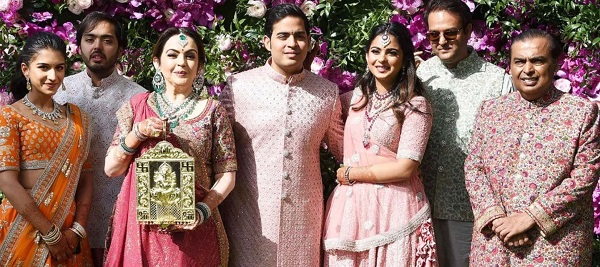Meet the tycoons behind the grand Indian wedding

For the last few months, Asia’s richest man Mukesh Ambani has been grabbing the spotlight in India.
It’s not because he has completed a major acquisition or cut a big philanthropic cheque, but it’s his son’s grandiose wedding celebrations that have entranced the entire nation and the world.
The pre-wedding parties, which began in March, have put the Ambani family firmly at the centre of many breakfast, lunch and dinner table conversations.
Anant Ambani, the youngest son of Mukesh Ambani, tied the knot with his long-time girlfriend Radhika Merchant at a family-owned convention centre in Mumbai on Friday, in a culmination of six-month-long festivities that have taken place across the globe.
Indian weddings can be lavish, but the sheer scale and size of the Ambani jamboree have perhaps eclipsed the celebratory fervour displayed by erstwhile royals.
The unerring presence of Bollywood A-listers at every party, the million-dollar performances by global pop-stars like Rihanna and Justin Bieber, and a bevy of VVIP dignitaries descending upon the celebrations have been a source of endless fodder for the paparazzi.
Consider some of the global elite who made it to the functions – Meta’s Mark Zuckerburg, Samsung CEO Han-Jong Hee, Bill Gates, former US President Donald Trump’s daughter Ivanka, former UK prime ministers Boris Johnson and Sir Tony Blair, Fifa president Gianni Infantino and the Kardashian sisters.
And the list goes on.
“These are very busy people. They aren’t coming just to have fun,” James Crabtree, author of The Billionaire Raj: A Journey Through India’s New Gilded Age, told the BBC.
“What this tells you is that global business leaders believe the Ambanis are strategically important and also that they see India as a very big market.”
Meet the family
The Ambanis are often described as India’s most prominent business family.
They run Reliance Industries, an oil to telecoms conglomerate that was founded by Mukesh Ambani’s father Dhirubhai Ambani – a man with a controversial legacy who attained legendary status for deftly navigating India’s controversial pre-liberalisation polity, while creating enormous wealth for his company’s shareholders.
Dhirubhai died in 2002, and the empire he founded was split between his two sons – Anil and Mukesh – after what could be described as one of India’s most acrimonious succession battles.
Since then, the brothers’ fortunes have diverged, with the younger Anil declaring bankruptcy and Mukesh pivoting more and more to consumer-facing businesses, even while retaining his pole position in Reliance’s mainstay – petrochemicals.
His oil refinery in the western town of Jamnagar is the largest in the world.
In recent years, Reliance has brought some of the world’s most celebrated luxury brands to India, from Valentino to Versace and Burberry to Bottega.
Among other things, the company now owns a team in the world’s richest cricket tournament and the iconic British toy retailer Hamleys.
In 2021, it acquired the historic country club Stoke Park in Buckinghamshire for £57m.
Earlier this year, Reliance signed a binding pact to merge its entertainment platforms with Disney, in its latest attempt to transform the company’s industrial moorings. It is a deal that makes Mukesh Ambani a formidable player in the digital streaming space, with rights to cricketing tournaments and international shows.
But the conglomerate really began its shopping spree during the Covid-19 pandemic, when it got billions of dollars in investment from more than a dozen global players, including Meta and Google. The plan with Meta has been to connect WhatsApp’s more than 400 million users in India with its online grocery platform JioMart.
The company’s aggressive pricing strategy has mounted a serious challenge to foreign entrants like Netflix and Amazon.
Privately, foreign players, who compete in the same sectors as Reliance, sometimes complain of a lack of level playing field, claiming the Ambanis are among a select few who’ve benefited from the Indian government’s policy of awarding preferential contracts to local tycoons.
“Foreign players face a difficult choice,” says Mr Crabtree. “They can either fight with Reliance or get into bed with Reliance. Zuckerburg has chosen to partner with them, while Amazon has decided to fight. But these battles are often very costly, and foreigners end up losing.”
Now, Mukesh Ambani’s next target is financial services, with Reliance entering into a joint venture with US-based BlackRock for a brokering and wealth management business.
Not surprisingly then, for the Ambanis, this is much more than just a wedding.
It is a show of strength and of the clout they command, says Harish Bijoor, a brand strategy specialist. “It’s a show of the fact that this family is a magnet that attracts people from all walks of life – business, politics and entertainment.”
The media blitzkrieg around it, he adds, is also a way for them to make a personal event “even more personal to the whole world” – such as the consumers of Reliance products and services for instance – who would never have got an invite.
If the Ambani patriarch, Dhirubhai, was credited with introducing the stock market to India’s retail investors, his son Mukesh is well recognised for creating a myriad touchpoints between his businesses and the average Indian consumer.
A bulk of what Indians consume today, from the shows they watch, to the clothes they wear and potentially even how they will transact in the future, comes from the Ambani stable.
And that is why there couldn’t have been a better occasion than a dazzling wedding for the family to market its brand to India’s burgeoning consumer class.
And sure enough, the wedding has captivated people in India and across the world.
Source: bbc.com





